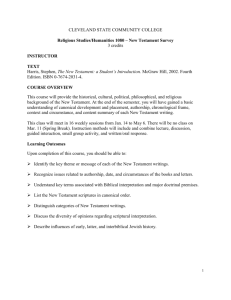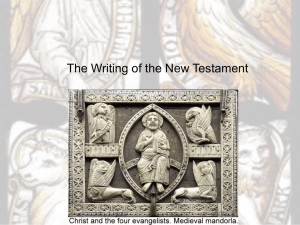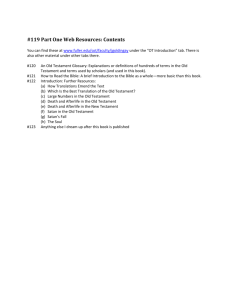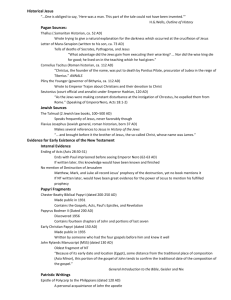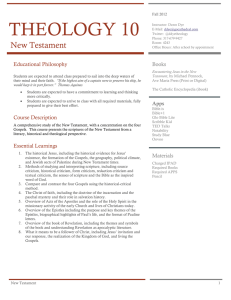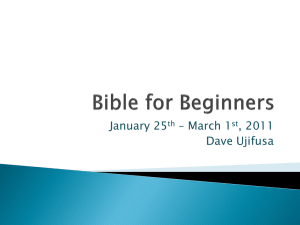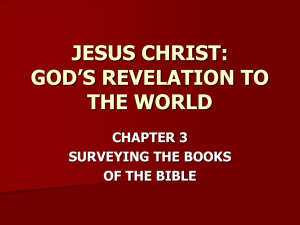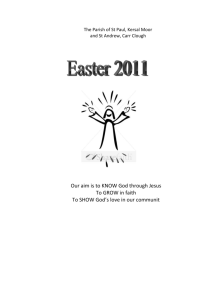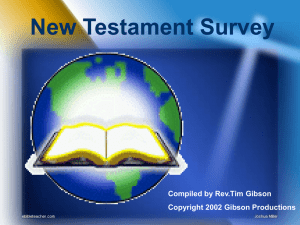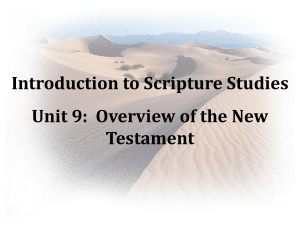新約概覽一之四福音
advertisement
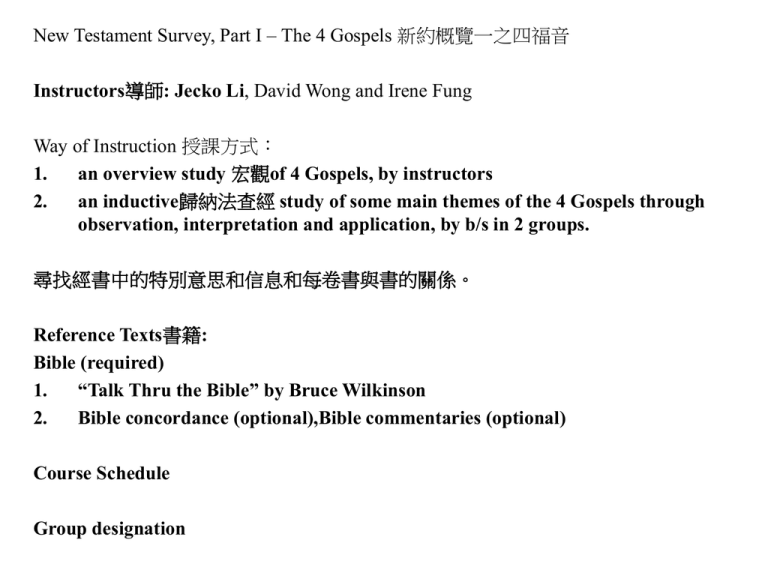
New Testament Survey, Part I – The 4 Gospels 新約概覽一之四福音 Instructors導師: Jecko Li, David Wong and Irene Fung Way of Instruction 授課方式: 1. an overview study 宏觀of 4 Gospels, by instructors 2. an inductive歸納法查經 study of some main themes of the 4 Gospels through observation, interpretation and application, by b/s in 2 groups. 尋找經書中的特別意思和信息和每卷書與書的關係。 Reference Texts書籍: Bible (required) 1. “Talk Thru the Bible” by Bruce Wilkinson 2. Bible concordance (optional),Bible commentaries (optional) Course Schedule Group designation 聖經 1. 書卷 - 新舊約 66卷 ONE BOOK-the Word of God,神的話語 – 漸進式的啟示,共同的架構,相同從神而來的 信息。 2. 約的意思 – 神的約訂,人與神以不同方法相 交:舊約 - 律法,新約 – 耶穌 新舊約期間 – 四百年 1. 舊約完於瑪 397 B.C,新約始於太 2. 四百年可分為以下六段時期: - the Persian, 536 - 333 B.C. - the Greek, Alexander the Great 333 - 323 B.C. - the Egyptian, 323 - 204 B.C. 七十士譯本 - the Syrian, 204 - 165 B.C. Antiochus the Great was harsh - the Maccabean, 165-63 B.C. Judas Maccabeus revolt - the Roman 63 B.C. onward . THE RELIGIOUS AND SPIRITUAL DEVELOPMENT There are new sects or parties: 1. Pharisees, ecclesiastical party 2. Sadducees, the wealthy and influential priestly families 3. Herodians. There are new institutions: 1. Synagogue會堂, Scriptures were read and expounded by the scribes. 2. Scribes 律法師 或文士,太5:20, 路7:30,a class of professional experts in the interpretation and application of the Law and the other Old Testament Scriptures. 3. Sanhedrin 公會(可14:55) supreme civil and religious tribunal of the Jewish nation. THE NEW TESTAMENT AND THE OLD TESTAMENT 1. The New Testament is the Answer to the Old. 2. The Jesus of the New Testament is the fulfillment of Old Testament ceremony, history, philosophy and prophecy (耶30:31). Pauline Epistles: Individuals Timothy 1 Timothy2 Titus Hebrews James Peter 1 Peter 2 John 1 John 2 John 3 Jude Revelation Colossians Philippians Ephesians Galatians Corinthians 2 Corinthians 1 Romans Acts Matthew Mark Luke Historical Books John Non Pauline Epistles &Revelation Pauline Epistles:Churches Thess 2 Thess 1 Philemon The New Testament - a progress of doctrine 1. 4 Gospels =God story or Good story, Greek work = good tidings or good news 2. Synoptic Gospels – seeing together Matthew, Mark, and Luke – same characteristics and common view point. Supplemental gospel – John 2 ways to view The Gospels and Acts 1. From authors: Matthew - was a Jew Mark - Mark, or "John Marcus" (Acts 12:12), was half Jew and half Gentile (John, Hebrew - Marcus, his surname, Greek). Luke - or Lucus, was a Gentile First to Jews - through Jew-Gentile - Gentiles Parallels with the three stages of movement in the Acts of the Apostles 1. The Gospel is preached within the confines of the Jews (Acts 1-7). 2. Then it spreads through Samaria, reaches to the Ethiopian Chancellor, and breaks forth with Pentecostal gusto on the Gentile (Roman) household of Cornelius (8-12). 3. Finally, through the missionary travels of Paul, it is preached freely and fully to the whole Gentile world (13-28). 2. Theme: about Jesus – from different facets Matthew – Jesus is Christ, fulfillment of OT Mark – Jesus is Servant, give His life a ransom for many. Luke – Son of Man, to seek and to save that which was lost. John – Son of God, offered eternal life to all who would believe in Him. climax declared the historical Jesus (reported in Matthew, Mark and Luke) is the eternal Son: 1. He who is Israel's Messiah is Himself Jehovah. 2. He who is the world's Savior is the world's Maker. 3. He not only teaches truth: He is the truth. He imparts life because He is the life. 1.Israel has rejected Jesus and the offered kingdom 2. The formation of the ecclesia, the local Church bringing to light a hidden purpose of God. That is the point where the book of the Acts leaves us. 3. See "the progress of doctrine" in the Epistles. Christian walk (3 words to summarize): 1. "faith" and 2. "hope" and 3. "love." As I Corinthians 13:13 puts it:"And now abideth faith, hope, love, these three: but the greatest of these is love." The three principal writers of our New Testament epistles are: 1. Paul, Peter and John, and they come in that order. 2. They all speak about faith, hope and love, yet each of them has an emphasis. 3. First comes Paul, who is distinctively the apostle of faith. Next comes Peter, the apostle of hope. Last comes John, the apostle of love. The arrangement is designed to indicate the true order of spiritual progress.
